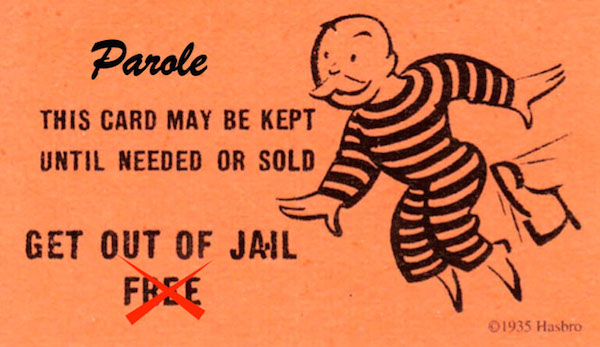
noun
- Penology.
- the conditional release of a person from prison prior to the end of the maximum sentence imposed.
- such release or its duration.
- an official document authorizing such a release.
- Military.
- the promise, usually written, of a prisoner of war, that if released he or she either will return to custody at a specified time or will not again take up arms against his or her captors.
- (formerly) any password given by authorized personnel in passing by a guard.
- word of honor given or pledged.
- (in U.S. immigration laws) the temporary admission of aliens into the U.S. for emergency reasons or on grounds considered in the public interest, as authorized by and at the discretion of the attorney general.
verb (used with object), pa·roled, pa·rol·ing.
- to place or release on parole.
- to admit (an alien) into the U.S. under the parole provision: An increased number of Hungarian refugees were paroled into the United States.
adjective
- of or relating to parole or parolees: a parole record.
noun French.
- language as manifested in the actual utterances produced by speakers of a language (contrasted with langue).
noun
-
- the freeing of a prisoner before his sentence has expired, on the condition that he is of good behaviour
- the duration of such conditional release
- a promise given by a prisoner, as to be of good behaviour if granted liberty or partial liberty
- a variant spelling of parol
- US military a password
- linguistics language as manifested in the individual speech acts of particular speakersCompare langue, performance (def. 7), competence (def. 5)
- on parole
- conditionally released from detention
- informal(of a person) under scrutiny, esp for a recurrence of an earlier shortcoming
verb (tr)
- to place (a person) on parole
n.1610s, “word of honor,” especially “promise by a prisoner of war not to escape,” from French parole “word, speech” (in parole d’honneur “word of honor”) from Vulgar Latin *paraula “speech, discourse,” from Latin parabola (see parable). Sense of “conditional release of a prisoner before full term” is first attested 1908 in criminal slang. v.1716, from parole (n.). Originally it was what the prisoner did (“pledge”); its transitive meaning “put on parole” is first attested 1782. Related: Paroled; paroling.
 Liberal Dictionary English Dictionary
Liberal Dictionary English Dictionary